Are you a Ph.D. student or a scholar searching the best AI tools to enhance the productivity and efficiency of your academic research and thesis? Here, we are going to introduce you to brilliant AI tools that will assist in automating your tasks, analyzing data, and aiding in thesis writing and research.
Should I use AI tools as a PhD student?
Using AI in your PhD studies can be very helpful, but its usefulness varies based on your study field and research specifics. Remember, AI is a helpful tool, not a replacement for a deep understanding of your subject, a clear research question, a solid methodology, and the ability to critically analyze and discuss results.
You should also understand how your AI tools work to properly validate their results and be aware of any limitations or biases.
Additionally, ensure that your use of AI complies with your institution’s education compliance policies to maintain academic integrity and ethical standards.
Moreover, AI’s acceptance in your field may vary, so consult with your supervisor or colleagues about its appropriateness.
Here are some factors to consider:
1. Data Analysis: AI tools can analyze and predict large data sets, and even create data. They use machine learning to find patterns and insights.
2. Literature Review: AI, like semantic search algorithms, can quickly find relevant papers and sources for your review.
3. Experimentation: In fields like physics, AI can run simulations and aid in experiments.
4. Writing and Editing: AI helps with translating languages, proofreading, and drafting parts of your thesis, saving time for core research.
5. Time and Efficiency: AI automates research tasks, making your work faster and more efficient.
6. Reproducibility: AI and machine learning’s reproducibility allows others to verify your results, crucial in scientific research.
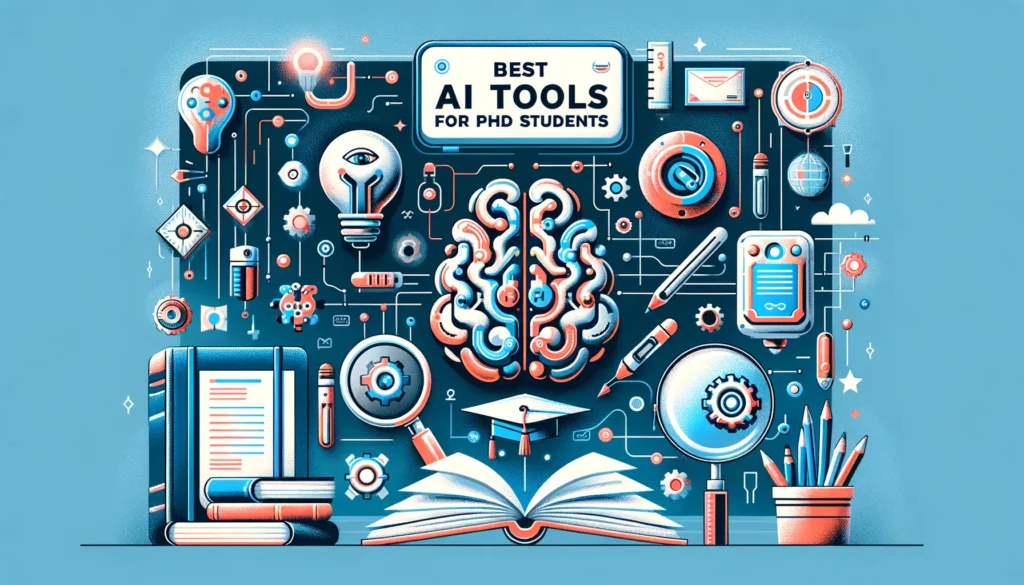
The Challenges Faced by PhD Students
PhD students, who are at the forefront of pushing academic boundaries, often face unique challenges. They must navigate complex research topics, manage large volumes of data, and stay abreast of the latest methodologies and technologies in their field.
For example, a Ph.D. student in environmental science might struggle with the analysis of large-scale climate data, while a student in humanities may find it challenging to sift through extensive historical texts.
The sheer volume and complexity of data can be overwhelming, leading to increased time and effort spent on data processing rather than on actual research and analysis.
5 Benefits of AI Tools for PhD Students
- Time Efficiency: AI tools significantly reduce the time required for data processing and analysis.
- Enhanced Accuracy: They offer improved precision in data analysis, minimizing errors.
- Complex Data Handling: AI can manage and interpret large and complex datasets effectively.
- Predictive Analytics: Enables forecasting and predictive modeling for advanced research insights.
- Automation of Tedious Tasks: Automates repetitive and mundane tasks, allowing students to focus on critical aspects of their research.
5 Best AI Tools for PhD students:
| AI Tool | Category | Description |
|---|---|---|
| Perplexity AI | Question Answering | It provides detailed, researched answers to a wide range of questions, suitable for academic research. |
| Scite AI | Research & Citation Analysis | It helps researchers understand and evaluate scientific articles using Smart Citations. |
| Trinka AI | Writing Assistance | AI-based writing assistant for academic and technical writing, offering grammar and style enhancements. |
| Jenni AI | Content Generation | It simplifies content generation, particularly for students and researchers, with advanced writing assistance features. |
| Lateral.io | Research Workflow | AI-powered research tool designed to simplify document review and information organization for academics and researchers. |
1. Perplexity AI
Perplexity AI is an AI-powered search engine and chatbot that uses state-of-the-art natural language processing and machine learning algorithms to provide accurate answers to complex questions.
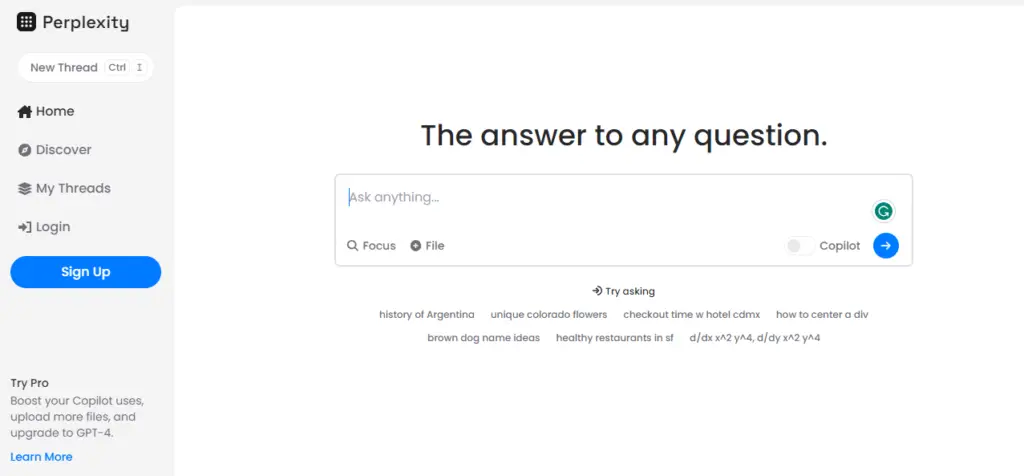
Key Features:
- AI-Based Search Engine: Powered by advanced NLP and machine learning algorithms for contextual understanding and analysis.
- Contextual Search: Delivers accurate results even for complex or ambiguous queries by analyzing multiple information sources.
- Natural Language Generation: Capable of generating human-like text for various applications like summaries and reports.
- User-Friendly Interface: Clean, intuitive interface for easy query input and quick response receipt.
- Interactive and Pedagogical Web Search: Supports research, material collection, and various modes for writing, solving math problems, coding help, and video search.
Pros
- Search-Focused AI Chatbot
- Runs on Advanced Models
- Web Search
- User-Friendly
Cons
- Conversational Limitations
- Limited Analytical Capabilities
Pricing Summary:
- Free to use
- Perplexity Pro Monthly Subscription: $20 per month.
- Perplexity Pro Annual Subscription: $200 per year.
2. Scite AI
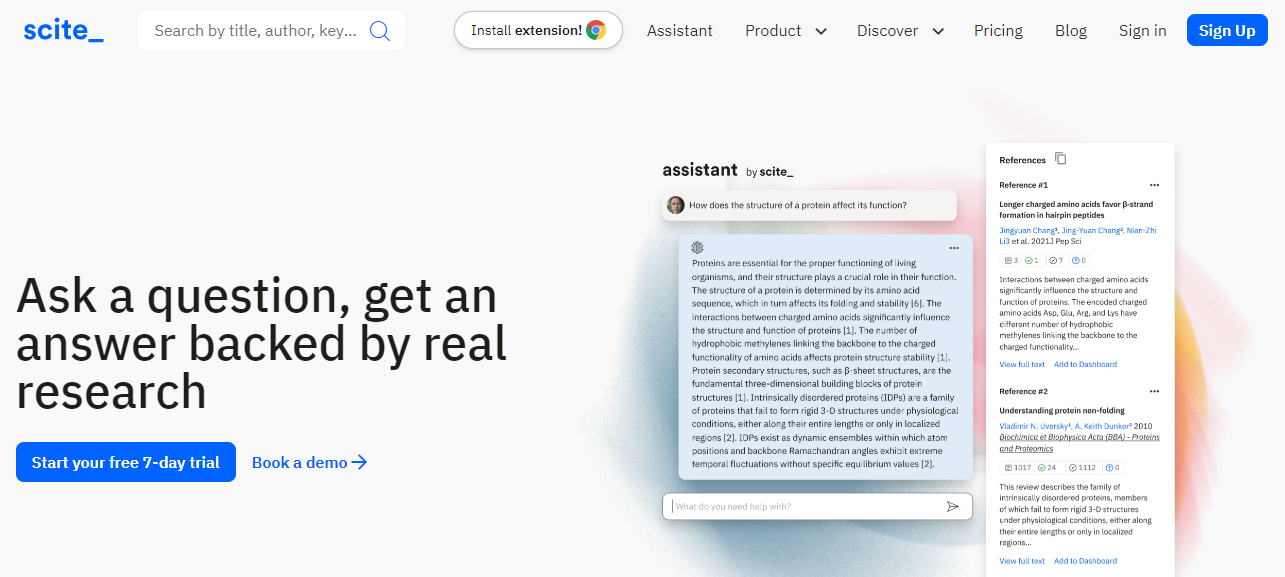
Scite AI
Scite AI is defined as an innovative research tool that utilizes artificial intelligence to assist researchers in discovering, understanding, and evaluating scientific articles. It features Smart Citations which provide context and classification for each citation, indicating if it supports, contrasts, or merely mentions the cited claim.
This assists researchers in assessing the reliability and impact of research articles and in discovering relevant and contradictory evidence.
Key Features:
- Smart Citations: Classifies citations as supporting, contrasting, or mentioning the cited claim, offering a comprehensive understanding of the citation context.
- AI-Powered Assistant: Answers research questions directly, saving valuable time and enhancing the research process.
- Full-Text Access: Grants access to research articles through indexing agreements with various publishers, providing a wide range of resources.
- Citation Extraction and Classification: Extracts and classifies citations from articles, creating a database of Smart Citations.
- Reliability Assessment: Enables researchers to assess the reliability of research articles, helping to avoid misinformation.
Pros
- Comprehensive Citation Context
- Time-Saving
- Wide Range of Resources
Cons
- No Free Plan
- Dependence on Publisher Agreements
Pricing:
Scite AI offers two main pricing plans:
- Individual Monthly Plan: Costs $20 per month, and includes all features of Scite AI.
- Individual Yearly Plan: Costs $105 per year, and offers the same features as the monthly plan at a discounted rate.
3. Trinka AI
Trinka AI is an AI-based writing assistant specifically designed for academic and technical writing. It assists with grammar, plagiarism, sentence structure, tone, and clarity, improving communication and writing quality.
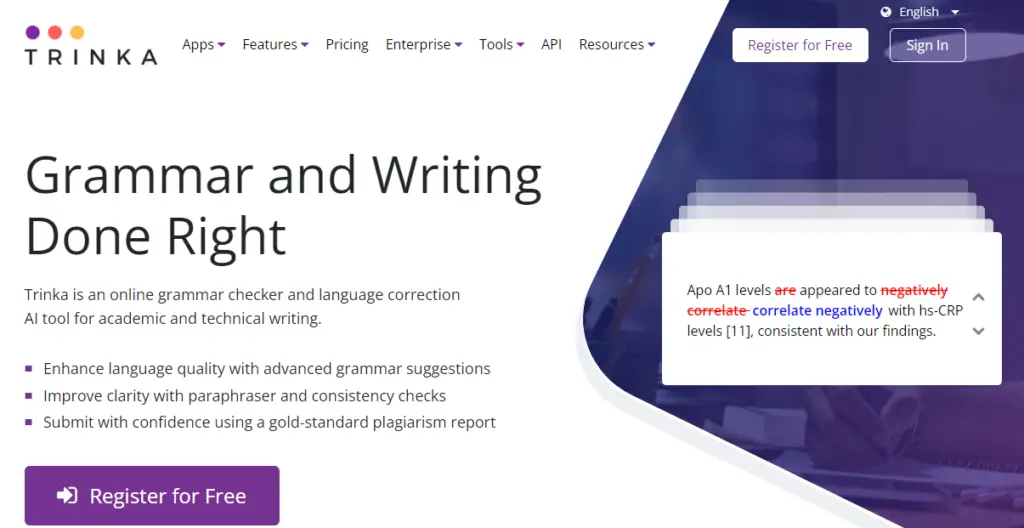
Key Features:
- Customization for Subject Area & Document Type: Tailor’s suggestions based on manuscript type and subject area.
- Style Guide Preferences: Aligns writing with academic style guides.
- Auto File Edit: Automatically edits and fixes Microsoft Word documents.
- Publication Readiness Checks: Evaluates writing against 20+ checkpoints like Ethical Compliance and Journal Selection.
- Consistency Checks: Detects and corrects writing inconsistencies.
Pros
- Free plan available
- Easy to use
- Browser Extensions
- Word integration
- Publication-ready writing
- Grammar and spelling checks
- Ideal for academic/technical writing
Cons
- Only English supported
- Basic plan limits (10,000 words/month)
Pricing:
Trinka AI offers a free Basic plan (limited to 10,000 words/month) and an Enterprise plan with unlimited access to all features, targeted towards organizations and academic institutions.
4. Jenni AI
Jenni AI

- Jenni AI is an AI-powered writing tool that simplifies content generation. It’s designed to assist in creating high-quality content, especially for students and researchers, by alleviating writer’s block and accelerating the writing process. The tool integrates technologies like custom AI, GPT-4, and AI21.
Key Features:
- Natural Language Processing (NLP) Capabilities: Exceptional at generating human-like text, maintaining consistency and engaging tone.
- Integration with Various Platforms: Compatible with knowledge bases and PDFs, allowing easy access to information and citations.
- Customization and Adaptability: Highly customizable for tone, style, and content preferences, making it versatile across different industries.
- Learning and Improvement Mechanisms: Continuously learns and refines suggestions for accuracy and relevance.
- Real-Time Suggestions: Offers dynamic suggestions as users type, enhancing flow and coherence.
Pros
- Efficiency and Time-Saving
- Improved Communication
- Adaptability to Various Industries
- Cost-Effective
Cons
- Limitations in Complex Tasks
- Data Privacy and Security Concerns
Pricing:
- Free Plan: Includes full platform access, a daily limit of 200 words, AI autocomplete, credible citations, and AI editing commands.
- Premium Plan: Costs $20 per month or $144 annually, offering unlimited word generation, priority access, and access to the latest features.
5. Lateral.io
Lateral.io is an AI-powered research tool designed to simplify the workflow of academics, researchers, and professionals. It provides a unified workflow for document review, helping users to find text quickly, stay organized, and maintain a clear overview of their findings.
Lateral.io uses AI to recommend relevant text across various papers, offers a super search feature across all documents, and includes a smart PDF reader for in-browser reading and highlighting.
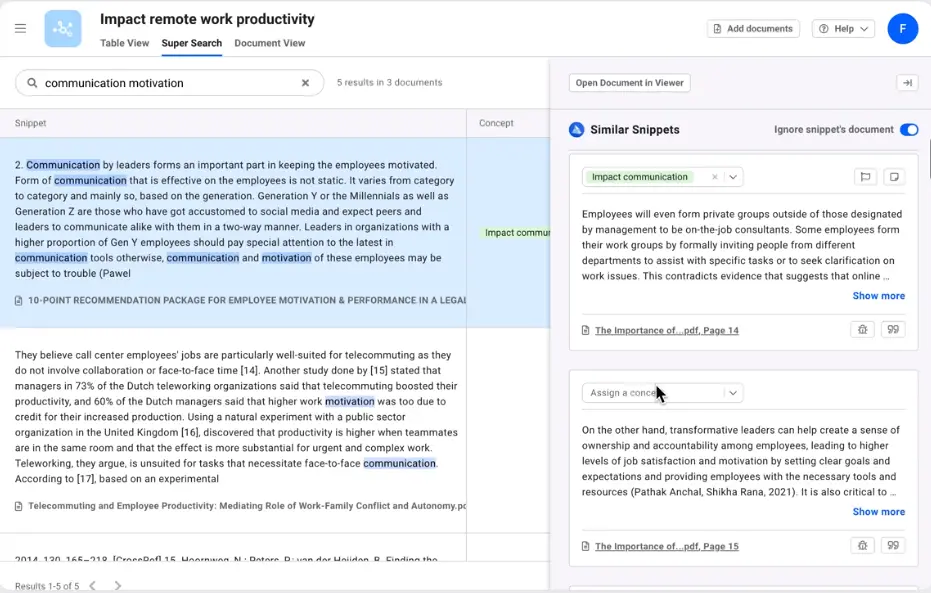
Key Features:
- Auto-Generated Table: Keeps a clear overview of findings and references.
- AI-Powered Concepts: Recommends relevant text across papers based on named concepts.
- Super Search: Searches across all papers and highlights similar results.
- Smart PDF Reader: Allows reading and highlighting in the browser and finding connections in the text.
- Export Findings: Directly export findings to Word or Excel with references.
Pros:
- Accelerates reading and note-taking (up to 10x faster)
- Enables searching across multiple documents
- Offers Document View for reading, highlighting, and organizing text
- Provides a generous free tier
- Suitable for enterprise usage with higher usage limits and better security
- Simplifies finding critical information with minimal effort
- Seamlessly integrates into users’ workflows
- Enhances research workflow efficiency
Cons:
- Requires storage of cookies for site navigation and marketing, which may concern privacy-focused users
- Blocking storage categories could impact user experience
- A premium plan starting at €9.99/month may be costly for some users
Pricing:
- Free Plan: Offers 500-page credits as a one-time benefit.
- Premium Plan: Priced at €9.99 per month, billed annually, with 21,600 page credits per year.
- Pro Plan: Costs €24.99 per month, billed annually, with 60,000 page credits per year.
Conclusion:
In conclusion, the Best AI tools for PhD students offer a range of functionalities to streamline research and writing processes. Tools like Perplexity AI, Scite AI, Trinka AI, Jenni AI, and Lateral.io are essential for enhancing productivity, offering features like advanced research analysis, grammar and writing assistance, content generation, and workflow optimization.
Each tool addresses specific needs, from data analysis to improving writing quality, making them invaluable assets for PhD students in various fields. Selecting the right AI tools can significantly boost the efficiency and effectiveness of academic research and thesis writing.
